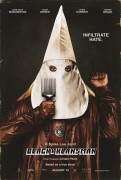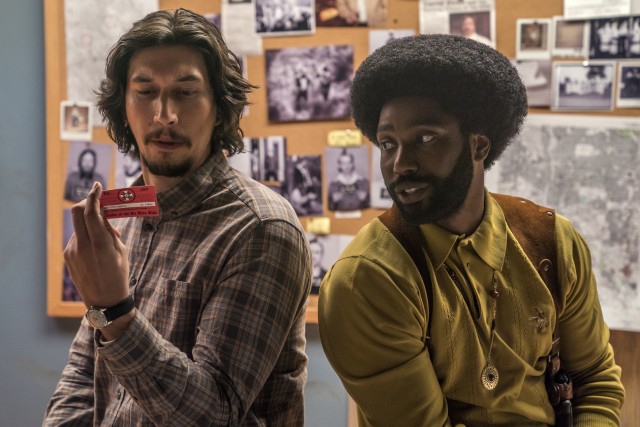BlacKkKlansman Movie Review
 |
BlacKkKlansman
Theatrical Release: August 10, 2018 / Running Time: 134 Minutes / Rating: R Director: Spike Lee / Writers: Charlie Watchel, David Rabinowitz, Kevin Wilmott, Spike Lee (screenplay); Ron Stallworth (book Black Klansman) Cast: John David Washington (Ron Stallworth), Adam Driver (Flip Zimmerman), Topher Grace (David Duke), Laura Harrier (Patrice Dumas), Ryan Eggold (Walter Breachway), Jasper Pδδkkφnen (Felix), Corey Hawkins (Kwame Ture), Paul Walter Hauser (Ivanhoe), Ashlie Atkinson (Connie), Alec Baldwin (Dr. Kennebrew Beauregard/Narrator), Harry Belafonte (Jerome Turner) |
Spike Lee has never gotten the recognition he deserved. When he began making movies in the 1980s, opportunities for black filmmakers were few and far between. Out of this environment, he wrote and directed Do the Right Thing, Today, filmmakers of color have more opportunities than ever before and their representation in the Academy membership grows at an exponential rate. And yet Lee hasn't directed something on the order of his early achievements. He helmed a commercial success in 2006's Inside Man and critical ones in 25th Hour (2002) and Chi-Raq (2015), but there hasn't been anything to earn him the fruits of past labors, as potential awards contenders (an English language remake of Oldboy, the World War II drama Miracle at St. Anna) have fallen completely flat.
BlacKkKlansman, Lee's latest feature as writer, director, and producer, wields some potential to push him back into relevance and auterial reflection. It tells the true story of Ron Stallworth, an African-American police officer from Colorado Springs who infiltrated the Ku Klux Klan. It also gives Lee the opportunity to reflect on racism in America, a force in several of his best-known works and a subject of clear and present interest to him.
The film opens with the most extras-filled scene of Gone with the Wind, then cuts to a hateful 1950s character played by Alec Baldwin extolling the virtues of White America and condemning the threat of inferior races. Imagine the Winnebago Man, but he's selling racism instead of RVs. This establishes an air of white supremacy which runs through the veins of the loathsome characters who claim a lot of BlacKkKlansman's substantial available running time.
But the bulk of our story is set in the 1970s and involves Stallworth (John David Washington, son of Denzel and a great discovery for those who haven't seen HBO's "Ballers"), a clean-cut young man with an Afro who overcomes skepticism to become Colorado Springs' first black detective. Saddled with the unstimulating task of working the records room, Stallworth gets an opportunity to go undercover when he attends a speech, wire taped on his chest, given by renowned black rights activist and feared agitator. Stallworth gets a read of the speech's reception and soon is promoted to the police's intelligent department.
There, a spontaneous phone call spearheads an ambitious undertaking. The rookie officer calls a phone number for more information from the local chapter of the Klan and is invited to meet with the hate group's leadership. In order to do that, Stallworth needs a white fellow officer -- the seasoned and professional Flip Zimmerman (Adam Driver) -- to perform the in-person duties. The two Ron Stallworths -- the black one putting on a white voice on the phone and Zimmerman trying to stay close to it, while corroborating fabricated biographical details -- work together to get deep within the Klan and close to the Organization's "grand wizard" and national director David Duke (a mustachioed Topher Grace).
BlacKkKlansman has the air of a '70s police procedural, but not surprisingly Lee is more fascinated by the subject matter and its ongoing relevance than simply the actual actions of the two Stallworths. The 135-minute runtime allows Lee and his three fellow screenwriters to explore both. From either angle, we have to endure much hateful rhetoric from the racist whites our pure-hearted minority police officers (Zimmerman is Jewish) have to pretend to conspire with. These are topics that produce strong opinions and feelings in people and Lee has to know that no Hollywood film is going to change closed minds and hateful hearts. If anything, BlacKkKlansman is more likely to inspire those who believe in the hateful ideas being espoused by antagonists (and plainly ridiculed by Lee and his collaborators) to lash out at the film and hit it with negative reviews on Internet sites where they have a voice. No doubt, this will draw a disproportionate number of 1 ratings when IMDb opens it up to voting. That, of course, is no reason not to make a film that you feel is important and worth telling and by just about every measure, BlacKkKlansman is.
Of course, even the best Lee films have some troubling aspects and this one isn't devoid of them. There are certainly some dubious bits in the depictions of the races that will draw some groans even from those who are completely on board with the agreeable views on racial equality. Dramatically, the movie is not without some faults either, as its tone wanders. And the scene that is meant to be the film's most joyous, a catharsis after all the hateful speech and slurs that have proceeded it, feels miscalculated and unfulfilling.
Even in light of all that, this is Lee's best work in a long time and a suitable marriage of material and filmmaker. Washington and Driver both deliver strong performances and the supporting cast does a decent job of performing the caricature that was apparently asked of them.
Opening in August, Lee's new film faces an uphill battle at being remembered all the way through the long awards season. Just last year, we saw Detroit tackle similar ground and get really good critical marks, but it opened in late July and the lack of an audience helped sink it from contention. Lee hasn't had a commercially significant film in twelve years (Inside Man) and the subject matter here probably makes this a tough sell. Nonetheless, it's easy to appreciate the fact that Lee is still making films and the way he wants, which is more than we can say for most directors (of any color) who were working over thirty years ago.
|
Related Reviews:
DVDizzy.com | DVD and Blu-ray Reviews | New and Upcoming DVD & Blu-ray Schedule | Upcoming Cover Art | Search This Site
DVDizzy.com Top Stories:
Now in Theaters: Eighth Grade Don't Worry, He Won't Get Far on Foot The Meg Christopher Robin The Equalizer 2
Directed by Spike Lee: 25th Hour & He Got Game Miracle at St. Anna
Imperium Detroit Get Out Three Billboards Outside Ebbing, Missouri
Adam Driver: Star Wars: The Force Awakens Logan Lucky | Topher Grace: Truth The Calling Traffic
Text copyright 2018 DVDizzy.com. Images copyright 2018 Amazon Studios, Iconoclast, and Anonymous Content Productions.
Unauthorized reproduction prohibited.

